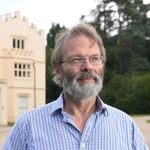Event Recording:
The conservation of biodiversity is usefully understood to be the maintenance of ecosystem health and restoration of endangered species.
In this presentation, Professor John Vucetich & Professor David MacDonald, will examine how the two most important phrases in that definition “ecosystem health” and “endangered species” are underdetermined to the point of being increasingly problematic for advancing real-world conservation concerns. Those ideas – ecosystem health and endangered species – can be adequately understood, but only with a significant dose of ethical reasoning that is missing from the discourse.
Many real-world conservation issues are also treated as negotiations between those who are for and against conservation, where the effort is either discovering a win-win outcome or the assertion of political power for some particular win-lose outcome. These hyper-political environments distract from steep ethical trade-offs that rise from the inevitable conflicts about four basic goals: conservation, social justice, animal welfare, and increased agricultural production. The best outcomes almost certainly require that more of society’s leaders become more facile with the ethical dimensions of these trade-offs.

Professor John A. Vucetich
Distinguish Professor, Michigan Technological University and Oxford Martin Visiting Fellow
Professor John Vucetich is from the School of Forest Resources and Environmental Science at Michigan Technological University. After graduating from Michigan Technological University with a BSc in Biological Sciences and a PhD in Forest Sciences, he took a Research Assistant Professorship at the same institution and became an Associate Professor in 2011.
He has authored or co-authored over 75 peer-reviewed articles that have been collectively cited more than 3400 times. His scientific research has led to valuable insight pertaining to predation and population genetics. Professor Vucetich has also distinguished himself as an expert in conservation ethics. That expertise is comprised of equal parts scholarly rigor and real-world conservation experience.
His writings on ethics have appeared in scholarly venues, such as Conservation Biology, Bioscience, and Conservation Letters and popular outlets such as The New York Times, Natural History, Huffington Post, and The Ecologist. Writing on a wide range of topics – trophy hunting, wilderness, endangered species, sustainability, animal welfare, and climate change mitigation – Professor Vucetich’s work has been acknowledged by its influence on policy and scholarship. He has been involved with numerous documentaries, art exhibits and museum exhibits which detail the wolves and moose of Isle Royale. He has been fictionalised as the main character in a novel (Winter Study by Nevada Barr), which made the New York Best-Sellers list at #10 for hard-cover fiction.

Professor David MacDonald
Director of the Wildlife Conservation Research Unit (WildCRU)
Professor David Macdonald CBE DSc FRSE is the Director of the Wildlife Conservation Research Unit (WildCRU) in the Department of Zoology, which he founded in 1986. He researches aspects of fundamental biology relevant to solving practical problems of wildlife conservation and environmental management, and thus to underpin policy formation and public debate of the many issues that surround the conservation of wildlife and its habitats.
He has published over 800 papers in refereed international journals, and written or edited more than a dozen books. His research developed from spatial aspects of carnivore social behaviour, including long-term studies of badgers, lions and Ethiopian wolves, to embrace highly inter-disciplinary approaches to conservation biology.
He has published two taxonomically-based volumes that consolidate much of his research on carnivores: 2004 The Biology and Conservation of Wild Canids, 2010 The Biology and Conservation of Wild Felids and a third, The Biology and Conservation of Wild Musteloids is underway. Two volumes cover Key Topics in Conservation Biology, 2007 and 2013. His most recent book Wildlife Conservation on Farmland 2015 is a synthesis of WildCRU’s work on British wildlife over the last 25 years.
David was awarded a CBE for services to natural sciences in the Queen’s Birthday Honours in 2010 and the Queen's Anniversary Prize for Higher Education in acknowledgement of WildCRU’s outstanding work in wildlife and environmental conservation in 2011. In 2015 he was voted in the top three most influential conservationists by the BBC’s Wildlife Magazine.
Keep in touch
If you found this page useful, sign up to our monthly digest of the latest news and events
Subscribe